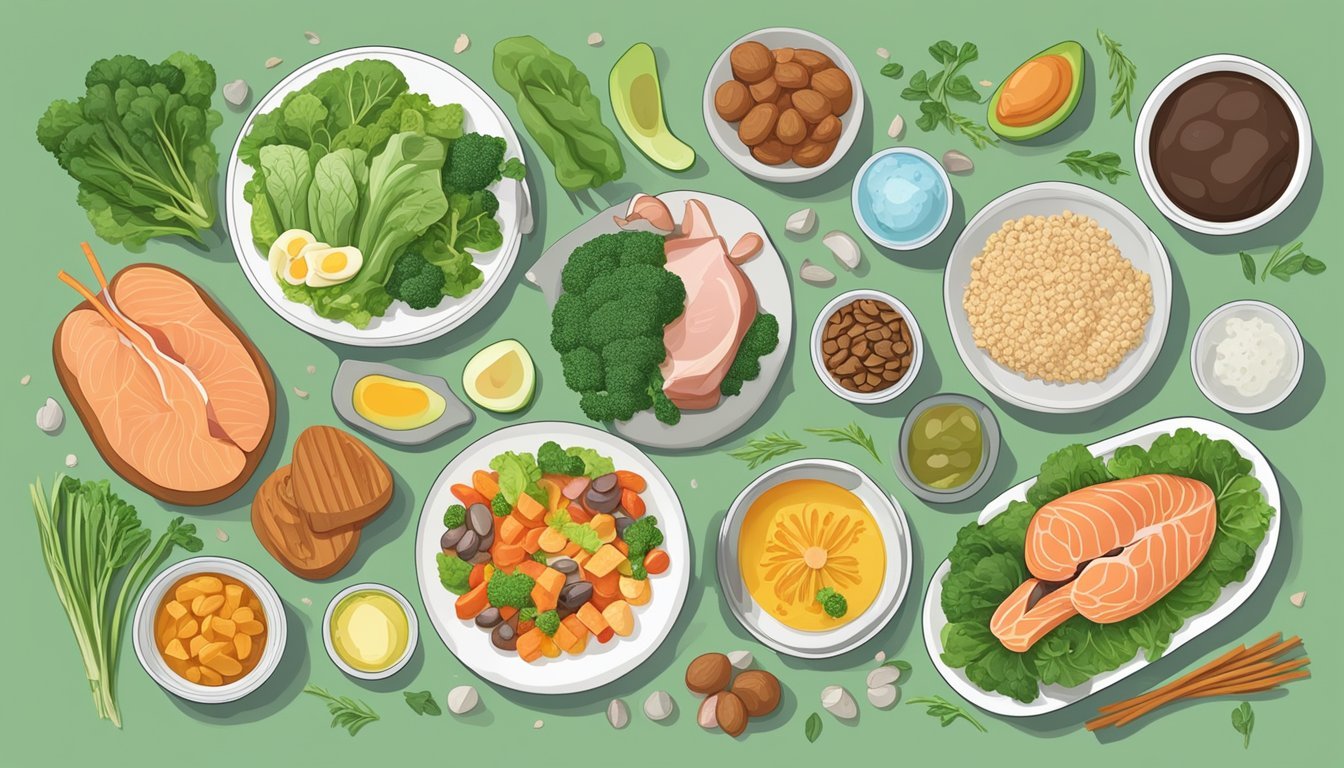Keto Diet and Kidney Stones
Understanding the Connection
The ketogenic, or keto, diet is a regimen that emphasizes a high fat, low carbohydrate intake and is often used for weight loss. While it has shown efficacy in reducing body weight and improving certain metabolic conditions, potential side effects have raised concerns among healthcare professionals. Among these, the relationship between the keto diet and an increased risk of kidney stones is a topic of interest. The formation of kidney stones is influenced by various dietary factors, and the specific nutritional composition of the keto diet may contribute to this risk.
Kidney stones are hard mineral deposits that form within the kidneys and can result in severe pain, urinary tract obstruction, and complications. Factors like dehydration, certain dietary intakes, and metabolic changes can heighten the risk of developing stones. The keto diet, being rich in fats and often associated with a higher intake of protein, alters the urinary environment in a way that could potentially favor the formation of uric acid and calcium stones.
It is recognized that the reduced carbohydrate intake on a keto diet leads to lower insulin levels and subsequent increased breakdown of body fat for energy. This metabolic state, known as ketosis, can lead to changes in urine composition, including increased acidity, which in turn may elevate the risk for uric acid stone formation. Furthermore, an increase in excretion of calcium in urine—a consequence of certain dietary patterns including high protein consumption—may contribute to calcium stone formation. However, the diet's impact may vary across individuals, and some suggest that health benefits like weight loss and controlled blood sugar levels might offset certain health risks if the diet is properly managed.
Understanding the Keto Diet
The keto diet centers on a low-carb, high-fat approach to eating, which can lead to weight loss and other health benefits. It requires a thorough understanding of its principles, the foods it includes, and the broader health implications beyond just weight loss.
Principles of Ketogenic Eating
A ketogenic diet significantly reduces carbohydrate intake, substituting it mainly with fat, and a moderate amount of protein. The goal is to enter a state of ketosis, where the body uses ketones from fat instead of glucose from carbohydrates as the main source of energy. To achieve ketosis, individuals typically consume no more than 20-50 grams of carbohydrates per day.
Common Foods in a Keto Diet
The ketogenic diet emphasizes the following foods:
High in Fat: Avocados, butter, coconut oil, and olive oil.
Protein: Meat, poultry, fish, eggs, and some dairy products.
Low-Carb Vegetables: Leafy greens, broccoli, cauliflower, and zucchini.
Nuts and Seeds: Almonds, walnuts, flaxseeds, and chia seeds.
Foods that are generally avoided include:
High in Carbohydrates: Bread, pasta, rice, and sugary snacks.
Fruits: Most fruits, except for small portions of berries.
Health Benefits Beyond Weight Loss
While the ketogenic diet is known for its effectiveness in weight loss, it can also offer other potential health benefits. These include improved blood sugar control, a reduction in insulin levels, and possibly improvements in neurological disorders. However, individuals should note that long-term outcomes and potential side effects require cautious consideration and consultation with a healthcare provider.
Kidney Stones Overview
Kidney stones are a common health issue that can impact anyone. They are formed from various substances in the urine and their development is influenced by multiple risk factors.
What Are Kidney Stones?
Kidney stones are hard deposits made of minerals and salts that form inside the kidneys. They can consist of various materials, with calcium, oxalate, uric acid, and citrate being key components. Stones vary in size and can be as small as a grain of sand or as large as a pebble.
Calcium stones: Made primarily of calcium oxalate or calcium phosphate.
Uric acid stones: Result from a lack of water or too much acid in the urine.
Struvite stones: Typically form following an infection.
Cystine stones: Occur in people with a hereditary disorder that causes the kidneys to excrete too much of certain amino acids.
Risk Factors for Kidney Stones
Several factors can increase the likelihood of developing kidney stones. They can be categorized as dietary and non-dietary risk factors.
Dietary risk factors include:
Low fluid intake
High intake of protein, salt, glucose or fructose
Low dietary calcium
High amounts of oxalate-rich foods
Non-dietary risk factors involve:
Genetic predisposition
Certain medical conditions
Use of specific medications
Obesity
Kidney Health: Maintaining a balance of water, salts, minerals, and other substances in the urine is crucial for kidney health and to prevent stone formation. Adequate hydration is especially important, as well as a balanced diet that does not provide extreme amounts of stone-forming substances. Citrate, found in lemon and lime juice, inhibits stone formation by binding to calcium, which may reduce the risk of forming calcium stones.
Connection Between Keto Diet and Kidney Stones
The ketogenic diet, a high-fat, low-carbohydrate diet that induces ketosis, may influence kidney stone
Nutritional Considerations for Kidney Health
Maintaining kidney health on a ketogenic diet involves strategic nutrition choices. This section details essential dietary components that are beneficial for preventing kidney stones, optimizing hydration, and ensuring the right balance of minerals and pH in the body.
Importance of Hydration
Hydration is paramount for kidney function and stone prevention. Individuals should consume sufficient water to produce at least 2 liters of urine daily. This often equates to drinking about 2.5 to 3 liters of fluids each day. Hydration assists in flushing out waste and diluting substances in the urine that might form stones.
Role of Calcium and Oxalate in Diet
It's crucial that dietary calcium is adequate to bind with oxalate in the gastrointestinal tract, reducing oxalate absorption and the risk of stones formation. Contrary to avoiding calcium, the goal is:
1,000 mg of calcium daily for most adults
1,200 mg for women over 50 and men over 70
A ketogenic diet may make it difficult to get enough calcium since many high-calcium foods like dairy products contain more carbohydrates. Calcium supplements could be considered, but it's better to meet needs through calcium-rich, keto-friendly foods such as cheese, broccoli, and kale.
The interaction between calcium and oxalate is such that foods high in oxalate such as spinach, rhubarb, and almonds should be consumed with caution as they might contribute to kidney stone development if calcium intake is insufficient during a ketogenic diet.
Balancing pH With Alkali Foods
A ketogenic diet can lower the pH of urine, making it more acidic and potentially increasing the risk of kidney stones. Incorporating alkali-rich foods that are keto-compatible helps balance urine pH. These foods include:
Vegetables: such as cucumbers and zucchini
Citrate: a key substance found in lemon and lime juice which helps to prevent stone formation by binding with calcium and inhibiting stone growth
Individuals on a ketogenic diet can also consider potassium citrate supplements, as these can help make urine less acidic. However, it's important to balance electrolytes under medical supervision to avoid adverse effects on heart and muscle function.
By focusing on adequate hydration, calcium and oxalate balance, as well as neutralizing urine pH through alkali foods and possibly supplements, one can support kidney health while adhering to a ketogenic lifestyle.
Special Considerations for At-Risk Groups
While the keto diet may offer benefits such as weight loss and blood sugar control, individuals with pre-existing health conditions should approach it with caution. The diet's impact on those with existing kidney disease, diabetes, and heart disease warrants careful consideration and medical guidance.
Keto Diet and Individuals with Existing Kidney Disease
Chronic kidney disease (CKD) patients should be particularly cautious with the keto diet. High protein intake, often associated with the diet, can increase the kidney's workload, potentially exacerbating kidney function decline. Those with CKD could face additional stress on their kidneys due to the diet's tendency to alter electrolyte and fluid balance.
Nutrient Consideration:
Protein: should be moderated to avoid overburdening the kidneys.
Electrolytes: careful monitoring is necessary to prevent imbalances.
Keto Diet Impact on Diabetes and Heart Disease
Type 2 diabetes patients may find the keto diet helpful for blood glucose control. However, they should monitor for hypoglycemia, especially if they are on medications that lower blood sugar. Moreover, for those with a history of heart disease, the keto diet's high fat content could be concerning. Heart patients should ensure their fat sources are heart-healthy, focusing on unsaturated fats rather than saturated fats, and constantly monitor their blood pressure.
Blood Sugar: Adjust medication under physician's supervision to avoid low blood sugar.
Blood Pressure: Regular monitoring is crucial as diet changes can affect blood pressure.
Lipids: Choose unsaturated fats to manage cholesterol levels and reduce the risk of worsening heart disease.
Patients managing obesity may benefit from the weight loss effects of the keto diet, but the approach should be balanced with the potential risks to their overall health. In all cases, consulting a healthcare professional before making significant dietary changes is essential.
Potential Benefits and Risks
Exploring the ketogenic diet reveals a dichotomy of potential health impacts, with particular concern for both its acclaimed benefits in managing weight and blood sugar and its implicated risks to bone health and cardiovascular systems.
Weight Loss and Blood Sugar Control
The ketogenic diet, high in fats and low in carbohydrates, prompts the body to enter a state of ketosis, where fat is burned for energy, often leading to weight loss. Supporters of the diet cite that, in addition to shedding pounds, it can improve blood glucose control, which is beneficial for those with type 2 diabetes. However, these positive results typically reflect short-term outcomes, and the lack of long-term data necessitates caution.
Weight loss: Increased fat metabolism can result in significant reduction of body weight.
Blood glucose control: By limiting carbohydrate intake, the ketogenic diet can lower blood sugar levels, often leading to reduced reliance on diabetes medication in the short term.
Bone Health and Cardiovascular Risk
The impact of the ketogenic diet on bone health is complex and not fully understood. Some studies suggest that the diet may lead to a higher incidence of kidney stones due to factors like increased urinary calcium excretion, acidic urine, and changes in gut bacteria. However, adequate intake of potassium and alkali citrate may mitigate this risk.
Bone health: Potential for increased kidney stone formation due to dietary imbalances.
On the cardiovascular front, there is a concern that the high intake of saturated fat on the ketogenic diet may elevate cholesterol levels, potentially increasing cardiovascular risk factors. The long-term cardiovascular outcomes are still up for debate, as some studies show an increase in risk factors while others demonstrate a reduction.
Cardiovascular risk factors: Elevated saturated fat intake may influence cholesterol and other risk factors for heart disease.
Each individual's response to dietary changes can vary. Therefore, consulting a healthcare provider before making significant alterations to one's diet is always advised, especially for those with pre-existing health conditions.
Medical and Nutritional Expert Guidance
When adopting a ketogenic diet, especially for managing medical conditions or chronic diseases, it is crucial to seek guidance from medical professionals and nutritional experts to mitigate risks like kidney stones.
Consulting with Healthcare Professionals
Individuals should consult with doctors before initiating a ketogenic diet, as certain health conditions could pose complications. Doctors can provide medical advice and may recommend blood tests or other diagnostic tools to monitor a patient's health during the diet, paying close attention to kidney function.
Working with a Dietitian
A dietitian can offer crucial expertise in formulating a ketogenic diet that minimizes the risk of kidney stones. They can ensure that the diet includes adequate calcium and potassium, and guide on proper hydration. The avoidance of excessive protein consumption and sodium intake is also part of their counsel to prevent potential negative effects on the kidneys.
Research and Studies on Keto Diet
Recent research and studies have observed the correlation between ketogenic diets and kidney stone formation. Observational studies and epidemiology play vital roles in understanding this connection. A meta-analysis can provide a broader underpinning by collating data across multiple studies, thereby offering evidence-based information for making dietary recommendations.
Research Note: Uric acid and calcium-based kidney stones have been noted as prevalent among individuals on ketogenic diets.
Consideration: Adjustments to the ketogenic diet may need to be made based on the emerging research findings to prioritize kidney health.
Managing Side Effects and Long-term Considerations
Adopting the ketogenic diet brings potential side effects, particularly in the short term as the body adapts. Long-term considerations focus on nutrient balance to maintain health while on this diet.
Dealing with Keto Flu and Other Short-term Side Effects
The ketogenic diet can cause an array of short-term side effects as the body transitions from glucose to ketone metabolism. These effects are collectively known as the keto flu, which can include fatigue, dizziness, and low blood sugar. To manage this:
Stay hydrated: Dehydration is common. Increase water intake.
Electrolyte balance: Ensure adequate intake of sodium, potassium, and magnesium to counter dizziness and fatigue.
Gradual transition: Slowly decreasing carbohydrate intake can help reduce the intensity of symptoms.
Long-term Sustainability and Nutrient Intake
Maintaining a ketogenic diet over the long term requires careful planning to avoid nutrient deficiencies and ensure the diet is sustainable.
Nutrient-dense foods: Prioritize variety in high-fat and high in protein foods to minimize the risk of nutrient deficiencies.
Fiber intake: Incorporate low-carb, high-fiber foods to prevent constipation and support gut health.
Monitor protein: A balance of protein is vital as excessive intake can hinder the maintenance of ketosis.
Regular check-ups: Frequent medical monitoring can help to adjust the diet and prevent long-term issues such as kidney stones, which have been observed in some adherents.
Conclusion
Incidence Rates:
Research indicates that individuals on ketogenic diets encounter a 5.9% incidence of kidney stones, with a slightly higher rate in adults (7.9%) compared to children (5.8%). The formation of uric acid stones is most prevalent, followed by calcium-based stones.
Diet Impact Factors:
Uric Acid and Calcium Stones: The ketogenic diet's high protein and low carbohydrate content may lead to increased uric acid and calcium in the urine, precipitating stone formation.
Citrate Levels: The restriction of fruits, which are a primary source of citrate, contributes to lower urinary citrate levels—a key factor in stone prevention.
Considerations for Increased Risk Individuals:
Individuals with recurrent stone formation should consider screening for genetic factors that influence risk. Moreover, the duration of adherence to the ketogenic diet can influence the likelihood of developing kidney stones.
Recommendations:
To mitigate risks, individuals following a ketogenic diet should monitor their hydration status rigorously, consider the adequacy of their citrate intake, and consult healthcare providers for personalized advice, especially if they possess a history of renal issues or a predisposition to kidney stone formation.





